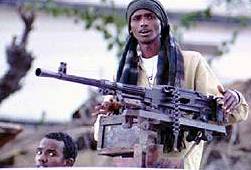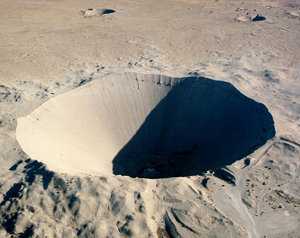The U.S. is shifting to a more direct role in the near decade-old fight against Al Qaeda-affiliated Shabab militants, launching as many as six drone strikes in southern Somalia over the last week to support African forces battling the group, American officials said.
The strikes, which preceded President Obama’s arrival in neighboring Kenya on Friday, were near Baraawe, a port city where troops from Kenya and other African countries, along with the fledgling Somali army, have been battling Shabab militants for weeks.
The U.S. cast the initial airstrike a week ago as a defensive maneuver to stop Shabab fighters who were moving to attack a military base being used by pro-government soldiers. Kenyan forces followed up the U.S. attacks with an artillery barrage that killed more than 50 fighters.
But the drone attacks have continued, officials said, a rare instance in which American firepower has been used to directly support ground skirmishes against the militants responsible for a wave of bombings and suicide attacks in East Africa.
The U.S. has provided intelligence, training and other logistical support to the Somali army and to African Union troops based there for years. Until now, however, the U.S. confined its role to targeted drone strikes and special operations raids against Shabab leadership.
It’s a change in how we’re providing support,” said a U.S. military official who was not authorized to speak publicly on the matter. “Up until now, we’ve focused strikes on high-value targets. These strikes were launched to defend forces on the ground.”
The decision to go on the offensive was a stroke of tactical luck, U.S. military officers said, after surveillance drones spotted fighters gathering in large numbers near Baraawe, which was once a Shabab stronghold.
“They’re massing,” said a senior U.S. official, referring to Shabab, “and massing provides targets, and targets get struck.” He spoke on the condition of anonymity to discuss sensitive operations.
The U.S. military’s Africa Command, which oversees operations on the continent, confirmed the airstrikes, but said the timing was not related to Obama’s visit to Kenya and Ethiopia.
“Over the past week, U.S. forces conducted a series of strikes against Al Shabab in defense of AMISOM forces under imminent threat of attack,” Patrick Barnes, a spokesman for the command, said in a statement. “The strikes prevented attacks by militants, which posed a significant threat to friendly forces.”
AMISOM is the African Union Mission in Somalia, a rotating force of about 22,000 troops from Kenya, Uganda, Burundi, Ethiopia and Djibouti.
Since deploying to Somalia in 2007, the troops have retaken the capital, Mogadishu, and driven militants from many towns in the south. Though weakened, the rebels have carried out frequent shootings, bombings and suicide attacks, and still control many rural areas.
The fight has been especially fierce for Baraawe, about 130 miles southwest of Mogadishu. Somali and African troops first claimed to have retaken the city in October, but they have been unable to stop attacks by the militants.
AMISOM officials have contended that they needed greater air support from the U.S. and its allies.
However, the U.S. was reluctant to become directly involved in the ground war, saying that the threat from Shabab could largely be countered without putting large numbers of American troops on the ground.
That reluctance stemmed in part from memories of a 1993 battle in Mogadishu in where 18 U.S. soldiers on a peacekeeping mission died after two helicopters were shot down by the forces of a local clan leader.
In October 2014, U.S. Navy SEALs stormed a coastal compound in southern Somalia hoping to capture a Shabab operative believed to have played a role in the group’s deadly 2013 attack on a shopping mall in Kenya, but the commandos withdrew after a firefight without capturing him.
In the last year, though, the American military presence in Mogadishu has grown from fewer than 10 soldiers to several dozen, charged with assisting African troops. More U.S. drones have also been shifted to Somalia, the senior U.S. officer said.
In recent months, Shabab has lost several top commanders to U.S. drone strikes. Ahmed Abdi Godane, Shabab’s shadowy commander, was killed in September, as was his predecessor, Aden Hashi Ayro, in 2008. Two other top Shabab officials, Yusuf Dheeq and Adan Garar, were killed this year.
Last week, Shabab claimed responsibility for an attack in northeastern Kenya in which militants opened fire on laborers and quarry workers, killing at least 14 and wounding 11.
Shabab has been forced into remote villages where they are under a reduced threat of an AMISOM attack and pay off local government, said Stig Jarle Hansen, author of a book about the militant group.
“They will melt into the countryside to fight a guerrilla war, and they might be able to exist there for years,” he said. “The drone strikes coordinated with AMISOM are probably the most efficient, as it will cater [to] the forces’ tactical needs and enhance their efforts on the ground.” |
 [BUSINESSWEEK] For the second time in six years, there's a vacancy at the top of the radical Islamist al-Shabaab
[BUSINESSWEEK] For the second time in six years, there's a vacancy at the top of the radical Islamist al-Shabaab
 [BBC.CO.UK] An air strike in southern Somalia has killed two senior commanders of the
[BBC.CO.UK] An air strike in southern Somalia has killed two senior commanders of the
